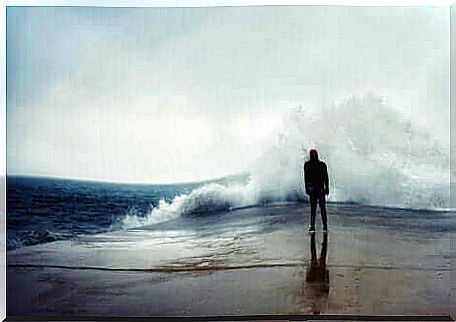Adversity Doesn’t Always Make Us More Resilient

Adversity doesn’t always make us more resilient. We have come to a point where the concept of resilience has become too bright and even far removed from reality.
Not everyone who goes through a time of trials and hardship manages to activate this wonderful skill. Sometimes tough days sink us and, the fact that it happens, is also quite normal.
We are living a moment of transformation at all levels. Perhaps this is why approaches such as the most optimistic positivism no longer serve us in the same way as they once did. Thus, the classic Always look on the bright side of life which was sung in The Life of Brian is no longer as effective under the current circumstances.
Right now, we are forced to see the difficulties and the risks that lie ahead. We cannot look away; it is not enough to say to yourself “everything will be fine and we will come out stronger”. It’s time to make room for other possibilities, to learn how to deal with adversity, negative emotions and that less sympathetic side of life.
Resilience is there, but it doesn’t work on autopilot. It doesn’t always activate, or when we need it most. This is why we need to understand how this valuable psychological skill actually works.

Adversity doesn’t always make us more resilient, but we can learn
We have become accustomed to calling experiences – like emotions – “good” or “bad”. This kind of situation causes a lot of people to become intolerant of anything that falls into the latter end. And in itself, this is understandable.
We prefer the stability, the complacency, the harmony of this daily life in which we give ourselves pleasure, enjoy this normality in which nothing is in disagreement and everything is in balance.
However, when the unexpected happens, the thread of trouble and the roar of difficulty are frequent, causing a blockage to appear. We find ourselves out of breath and without psychological resources to move forward in the storm.
Adversity doesn’t always make us more resilient because not all of us know how to activate it. Plus, there are times when what we have in front of us is a moment of great hardness that not everyone manages to overcome. Let’s go a little further.
Resilience is not facing adversity, it is “navigating” with it
Often when we talk about resilience, it is common to use the metaphor of the lighthouse. We visualize a rough sea with violent waves attacking this construction whose resistance is infinite. No matter the winds, storms and force of a thousand oceans, this lighthouse can withstand anything.
This metaphor of resilience is wrong. Instead, we should use a vision that is a little less heroic, a little less luminous and inspiring. It is best to follow the lesson of the “sea buoy”. It consists of the following elements:
- Instead of fighting the waves (adversity), we have to move with them like sea buoys do.
- You need to maintain your buoyancy, that is, your mental clarity and temperance to get through these stormy days.
- The real key is to have something to hold onto (to have an anchor).
- This inner anchor is also made up of our thoughts, attitudes and behaviors. They are what holds us back and helps us through these difficult days.
Adversity doesn’t always make us more resilient (there are processes that take time)
Adversity doesn’t always make us more resilient. Sometimes tough days are just that, tough days that bring us down for a while, without teaching us any lessons. Other times, we can’t activate resilience because we lack these anchor points, these adaptive resources.
- There are times when we fall in the midst of adversity. The fact that this is happening is more normal than we think.
- If this were not so, there would be no psychologists, psychiatrists or any other specialist in mental health. Because we are not heroes, we are not beacons that stand up to everything. We are human beings, fallible, who sometimes fall.
- It is perfectly normal to need other experts to give us the tools to deal with what hurts.

Some people can handle it all, others just aspire to survive
Adversity doesn’t always make us more resilient, it’s true. Moreover, there are those who are immensely skilled in these circumstances: not only do they face any difficulty, but they even take advantage of it. Others, on the other hand, are limited to being in survival mode. That is to say, endure what is happening, stay afloat so as not to drift.
Let’s be clear, both situations are equally acceptable and admirable. The goal, in any case, when the dark days come, is to come out with good physical and mental health. This is the real success and our real goal.
Some will cross this threshold with better resources and new earnings. Others will only feel relief to have left this fog to enter a new phase.
Either of these two circumstances is appropriate. The important thing is to continue to navigate, to continue to advance towards a horizon of hope.










